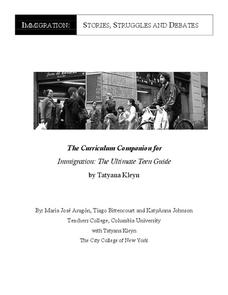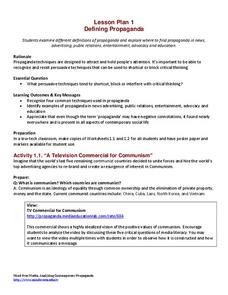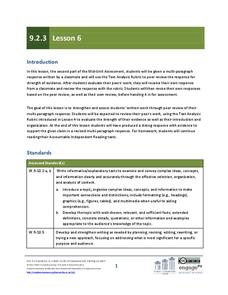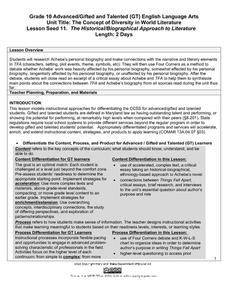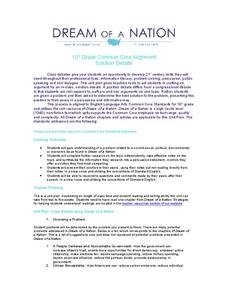EngageNY
Grade 9 ELA Module 4, Unit 1, Lesson 5
What did the Crusades and plantations do with the global sugar spread? As class members continue their study of Sugar Changed the World, they examine how Crusaders brought sugar to Western Europe and how cultivating sugar led to the...
Curated OER
Immigration: Stories, Struggles and Debates
Considering including Tatyana Kleyn's Immigration: The Ultimate Teen Guide as part of your course? Check out this curriculum guide designed for use with her book. The activities help learners understand the complexity of the immigration...
Media Education Lab
Sponsored Content as Propaganda
What is sponsored content? Who produces sponsored content? Why? Is it fair or unfair? What are the privacy implications for consumers? To answer these questions, class members view a model screencast before crafting their own that...
Media Education Lab
Defining Propaganda
21st century learners live in a media world. Help them develop the skills they need to be able to analyze the barrage of propaganda they face daily, with a resource that introduces them to the type of persuasive appeals found in news,...
Alabama Learning Exchange
Edgar Allan Poe's Journey Through Life and Literature
How was Edgar Allan Poe able to create "intriguing, memorable, and lasting literature"? To answer this question, learners analyze the syntax, diction, and characterizations in Poe's poems and short stories and compare the impact of these...
Brown University
Following the U.S. Presidential Election
Election years provide the opportunity to evaluate news media as well as the next prospective president. High schoolers read about the same event in several different news sources, varying in type, origin, and political leaning, before...
Turabian Teacher Collaborative
Parts of Argument II: Article Critique
Break down the parts of argumentative writing with a critical thinking activity. High schoolers read an article of your (or their choice), and use a graphic organizer to delineate the ways the author structures his or her arguments.
EngageNY
Grade 9 ELA Module 2, Unit 3, Lesson 13
Using the open-ended discussion questions developed the day before, class members engage in a fishbowl discussion of the three texts that anchor the unit: “True Crime: The Roots of an American Obsession," “How Bernard Madoff Did It,” and...
EngageNY
Grade 9 ELA Module 2, Unit 3, Lesson 12
As the first in a two-part, end-of-unit assessment that encourages readers to synthesize the unit's main ideas, class members review their notes for each of the three texts they read and develop three open-ended discussion questions...
EngageNY
Grade 9 ELA Module 2, Unit 3, Lesson 11
Who is to blame for Bernie Madoff's crime? Class members look for evidence Diana B. Henriques uses in The Wizard of Lies: Bernie Madoff and the Death of Trust to support her claims that we share the responsibility with Madoff.
EngageNY
Grade 9 ELA Module 2, Unit 3, Lesson 10
Did Bernie Madoff fit the profile of a Ponzi schemer because, as Diana Henrique contends in an excerpt from her The Wizard of Lies: Bernie Madoff and the Death, he “did not fit the profile of a Ponzi schemer”? Huh? Groups begin their...
EngageNY
Grade 9 ELA Module 2, Unit 3, Lesson 6
As part of a mid-unit assessment, class members exchange their draft of a multi-paragraph essay with a classmate, review their partner's writing using the provided text analysis rubric, and evaluate the strength of evidence, the...
EngageNY
Grade 9 ELA Module 2, Unit 3, Lesson 3
"We need forgiveness and someone to blame." True? Class members continue their analysis of the central claims in Walter Mosley's essay and the support he offers for these claims about people's fascination with crime.
EngageNY
Grade 9 ELA Module 3, Unit 1, Lesson 2
Autism isn't an illness or a disability. In the first chapter of Animals in Translation, we learn about Temple Grandin's unique ability to understand animals through her experience with autism. Having read pages four through eight for...
Maryland Department of Education
The Concept of Diversity in World Literature Lesson 11: The Historical/Biographical Approach to Literature
How affected is Thinks Fall Apart by Chinua Achebe's personal biography? Using a four corners strategy, and evidence from their readings, class members debate the degree of biographical influence in Achebe's novel.
Maryland Department of Education
The Concept of Diversity in World Literature Lesson 10: Author's Purpose Seminar
Why did Chinua Achebe write "An Image of Africa: Racism in Conrad's Heart of Darkness" in response to Conrad's novel? As part of a study of Things Fall Apart, class members conduct a socratic seminar focused on Achebe's purpose and...
Maryland Department of Education
The Concept of Diversity in World Literature Lesson 9: Debating Imperialism
To gain an understanding of Imperialism, class members read Rudyard Kipling's poem, "The White Man's Burden" and Mark Twain's essay, "To the Person Sitting in Darkness." Groups compare these perceptions of non-white cultures with the...
Maryland Department of Education
The Concept of Diversity in World Literature Lesson 4: Proverbs
"Eneke the bird says since men have learnt to shoot without missing, he has learnt to fly without perching." As part of their study of Things Fall Apart, class members read Paul Hernadi and Francis Steen's essay, "The Tropical Landscapes...
Maryland Department of Education
The Concept of Diversity in World Literature Lesson 1: Unit Introduction
To launch a unit study of the concept of diversity in World Literature, class members compare Chinua Achebe's essay, "An Image of Africa: Racism in Conrad's Heart of Darkness" and Richard Rodriguez's essay, "The Chinese in All of Us: A...
Maryland Department of Education
The Concept of Identity Lesson 7: Logical Fallacies
What are the effects of competition in an academic environment? The competition between the main characters in A Separate Peace motivates a series of activities that asks readers to take a stance on competition, and then to develop a...
Dream of a Nation
Solution Debate
Class members choose a current social, political, environmental, or economic problem presented in Tyson Miller's Dream of a Nation: Inspiring Ideas for a Better America, research this problem and a variety of suggested solutions, before...
Dream of a Nation
Congressional Debate
Should junk food be banned in schools? Should the US open its borders to all immigrants? Should the US impose term limits for the House of Representatives and for the Senate? Using Tyson Miller's Dream of a Nation: Inspiring Ideas for a...
Dream of a Nation
Group Presentation Assignment
Rather than waiting for the world to change, encourage your class members to become agents of change with a project that asks groups to select an issue found in Tyson Miller's Dream of a Nation: Inspiring Ideas for a Better America....
Warren County Public Schools
Citing Textual Evidence
By using explicit textual evidence, individuals can strongly support their ideas and opinions. The presentation suggests in order to use explicit textual evidence, one must state their idea, cite evidence in the text that led to the...



